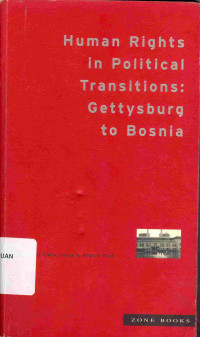
Text
Human Right in Political Transitions: Gettysburg to Boston
Arguments for transforming the human rights movement so that it can more effectively address new political realities.This book brings together prominent scholars and political activists to assess the evolution of the international human rights agenda since the end of the Cold War. It argues for a major reorientation of the objectives and strategies of the human rights community in light of the emergence of renewed and often virulent forms of political tyranny and civil conflict. For many years, the primary objective of human rights proponents has been to ensure the adoption, monitoring, and enforcement of international agreements. Our ability to enforce such agreements, however, presupposes cultures in which law is a basic element of the social order. Today the world must deal with extreme cases of human rights abuse―in places like Rwanda, Bosnia, Haiti, and Cambodia―that involve societies undergoing dramatic political transitions. In these countries violent conflict can be ended only by the establishment of new democratic regimes and the rule of law. In the post-Cold War era it has become increasingly clear that full protection of human rights depends upon the creation of such regimes. Organized around the themes of punishment, reconciliation, and law, the essays argue that the scope of human rights activism must expand beyond human rights agreements to active assistance for transitional societies in the reconstitution of civic and political order.
Availability
| KP.1.000251 | KP.1 HES h | My Library | Available |
Detail Information
- Series Title
-
-
- Call Number
-
KP.1 HES h
- Publisher
- Amerika Serikat : Zone Books., 1999
- Collation
-
344p. : ill. ; 24cm
- Language
-
Indonesia
- ISBN/ISSN
-
1-890951-01-3
- Classification
-
KP.1
- Content Type
-
-
- Media Type
-
-
- Carrier Type
-
-
- Edition
-
1999
- Subject(s)
- Specific Detail Info
-
-
- Statement of Responsibility
-
-
Other version/related
No other version available
File Attachment
Comments
You must be logged in to post a comment
 Computer Science, Information & General Works
Computer Science, Information & General Works  Philosophy & Psychology
Philosophy & Psychology  Religion
Religion  Social Sciences
Social Sciences  Language
Language  Pure Science
Pure Science  Applied Sciences
Applied Sciences  Art & Recreation
Art & Recreation  Literature
Literature  History & Geography
History & Geography